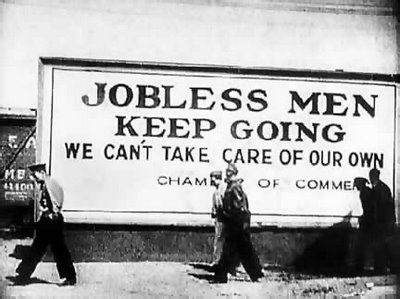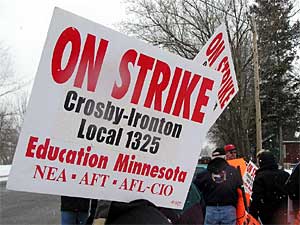“Debt crisis: stock markets panic” was the first entry to the Guardian on line in the aftermath of the Dow’s recent 4 percent rout. Bloomberg News noted that more than $4.5 trillion has been erased from the value of equities worldwide since July 26th. The Los Angeles Times headlined that “Global sell-off intensifies pressure on governments to stave off recession.”
Vicissitudes of a Theory
During the 1970s, Michael Löwy, a leading intellectual of the Trotskyist Fourth International, attempted to generalize Leon Trotsky’s "theory of permanent revolution" into a general theory that could explain not only the Russian, but also the Yugoslavian, Chinese, Vietnamese, and Cuban revolutions. He believed his version of the theory could explain recent and still unfolding events in the colonies and developing nations of Asia, Africa, and Latin America.
Something Fishy about the Pew Report
Everyone knows that there’s an enormous looming crisis of underfunded public pensions, a veritable ticking time bomb that will saddle every man, woman and child with insurmountable debt. We know this because, among other reasons, the widely respected Pew Center for the States published a study entitled, “The Trillion Dollar Gap.” We know this because it echoes through the media — print, internet or talking head. A Google search shows more than 29,000 results for this pairing.
Co-opted?
Venezuela, a moderately prosperous nation with rosy relations with both the United States and global capital, was an unlikely setting for a socialist renaissance. The 1998 election of Hugo Chávez appeared to be nothing more than a parliamentary victory for a bombastic social democrat, surprising but hardly epochal.
The Jobs Crisis: How to Solve It and Begin to Fix Our Broken Economy

The United States has an ongoing jobs crisis that has been crippling our people and our economy for nearly two years. In September 2010, 14.8 million people were officially unemployed, 15.7 million were either forced to work part-time or were jobless and no longer looking for work and another 16.3 million were the working poor. Thus, almost 47 million people were afflicted by unemployment or underemployment (see table 1). Moreover, the numbers multiply when the families of the unemployed are included.
Liu Xiaobo and the Nobel Peace Prize – Debate within China
A fascinating analysis of Liu Xiaobo and the Nobel Peace Prize has been circulating in Europe but has not, to my knowledge, been reprinted in the US, in print or online. Au Loong Yu, who wrote about China for the New Politics symposium on labor’s response to the global economic collapse, rejects the premises of a debate that is “primarily between the liberals who support Liu Xiaobo and the nationalists is essentially a debate of either Washington or the
Why Socialists Should be Deficit Hawks
Christina Romer, the former chair of the President’s Council of Economic Advisors, argues in today’s (October 24) New York Times that “Now Isn’t the Time to Cut the Deficit.” Her argument, which is unexceptional among liberal economists, is simply that “tax cuts and spending increases stimulate demand and raise output and employment; tax increases and spending cuts have the opposite effect.” This, she reassures her readership, is a “basic message of macroeconomics.”
France: Crescendo of the Class Struggle
In France we have just experienced a great wave of strikes that directly addressed matters of political power. French history is defined by explosions of militancy which, for our governing class and for most of our journalists, are a "French sickness" that would be good to get rid of: before 2003 there was 1995; before 1995, 1968; before 1968, 1953 and so forth, all the way back to the Revolution. But this time there is something new: the latest wave of militant action is not an end to itself and is only an introduction.
A Rejoinder to the Monthly Review-Keynesian Debate
Monthly Review magazine, which long continues to have cache on the left—especially with regard to economic analysis—is currently hosting a debate on the so-called “Minksy moment.” MR, of course, long defends the view advanced in the 1960s by Paul Sweezy’s and Paul Baran’s book Monopoly Capital.
What's right – and wrong – in Diane Ravitch's new take on school reform
Five friends, none of them teachers, have called to tell me they heard about Diane Ravitch’s new book and her change of heart about the school reforms she advocated for a decade. “Lo! She’s saying what you’ve been telling us!”
The publicity for Ravitch’s book has certainly put her incisive critique of the reforms (privatizing education; using standardized tests to measure everything; looking to “choice” and charter schools drive improvement) in the news.
India: General Elections 2009 and the Neoliberal Consensus
The General Elections 2009 have further entrenched the rule of neoliberal capital.[1] This entrenchment has happened due to certain factors, two discussed here in detail. These two factors include the distancing of the Left from working class politics towards electoralism, which resulted in absence of a long term mobilizational politics along class lines; and the role played by identity politics in the consolidation of the neoliberal regime.
Why We Need a Global Green New Deal
The United States, and with it the rest of the world, is experiencing the initial stages of an unprecedented emergency brought on by three intertwined factors: a credit-fueled financial crisis, gyrating energy prices linked to speculation about the future peaking of oil supplies, and an accelerating climate crisis.
In Defense of Washington and Wall Street
1. The Crisis of 2007-2008
THE VERY ELDERLY ARE PRONE TO FALL. And unlike infants who also tumble frequently, each time seniors stumble, they risk a disabling or even a fatal injury. On August 9th 2007, after an unparalleled quarter century long expansion, which had been checked in the developed countries only mildly and briefly, capitalism finally tripped and lost its balance with predictable results: banks tottered, while credit and commercial paper markets writhed in paralysis.
China: End of a Model…Or the Birth of a New One?
CHINA’S THIRTY YEARS OF NEARLY UNINTERRUPTED HIGH GROWTH has encountered great challenge as the global economic crisis has hit China’s export hard. Since China’s trade as a percentage of GDP is as high as 70 percent, the export-led growth mode has practically ended. The Chinese Communist Party (CCP) is aware of this. Back in April, 2008 President Hu Jintao spoke of the need to change the mode of development from export-led growth to domestic-led growth by expanding domestic demand.
